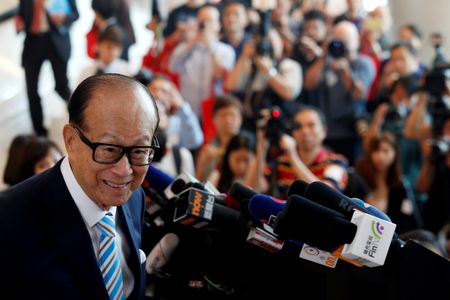SINGAPORE (Reuters) – Shares in Myanmar-focused conglomerate Yoma Strategic Holdings fell nearly 17% in Singapore on Wednesday after the company said Executive Chairman Serge Pun was cooperating with authorities in the capital Naypyitaw on bank business matters.
“There are no charges filed against him,” the company said in a statement, adding that Pun had been meeting with authorities including the central bank.
“As a responsible business organisation in Myanmar, the group engages with the relevant government ministries and regulators from time to time.”
The Myanmar Now news outlet reported on Tuesday that Pun had been detained for more than a month over alleged violations of banking regulations, citing anonymous sources.
A Myanmar junta spokesman did not respond to calls from Reuters seeking comment.
Yoma Bank, one of Myanmar’s largest commercial banks that was founded by Pun, has come under scrutiny alongside six other private lenders for breaching housing loan norms set by the Central Bank of Myanmar (CBM), a state-run newspaper reported last week.
“Some private banks grant large sums of housing loans, breaking the directives of the CBM for their own sake,” the Global New Light Of Myanmar said on July 2, adding that the lenders and central bank officials will face action.
Pun is currently Executive Chairman of Yoma Bank, according to the lender’s website. The bank is part of First Myanmar Investment, a Yangon-listed company that is part of Pun’s businesses along with Yoma Strategic.
A property tycoon whose interests have expanded into financial services, food and auto sales, Pun worked in Hong Kong before returning to Myanmar and leading Yoma Strategic’s 2006 listing on the Singapore Stock Exchange, according to the group’s website.
Yoma stock dropped as much as 21.5% in early trade and was last down 16.7% at S$0.1319 (9.8 U.S. cents), its lowest for two weeks.
Myanmar’s economy has been in turmoil following a 2021 coup where the country’s powerful military ousted an elected civilian government, triggering widespread protests that have given way to a nationwide armed rebellion against the junta.
Escalating violence, labour shortages and a depreciating currency have made it harder to do business, according to the World Bank, which has also forecast that economic growth is likely to remain at a measly 1% in the current fiscal year.
To stabilise its rapidly depreciating currency and rampant inflation, junta authorities have made dozens of arrests in recent weeks, including a Japanese national working for a supermarket chain in Myanmar.
($1 = 1.3496 Singapore dollars)
(Reporting by Tom Westbrook and Reuters staff; Editing by Tom Hogue, Michael Perry and Christian Schmollinger)










